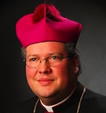
Prime Bishop Anthony Mikovsky
Lenten Renewal
As we now find ourselves halfway through this Lenten season it is my prayer that all of us, as faithful Polish National Catholics, have integrated the spiritual disciplines of increased prayer, increased fasting, and increased giving into our daily living. But as we perform these acts of spiritual discipline, we must also concern ourselves with the motivation behind them. Why do we seek to follow this road of discipline during Lent?
To that end, I am always very careful to use the word ‘increased’ in discussing these Lenten disciplines. The disciplines of prayer, fasting and giving are meant to be an integral part of the entire Christian life for each and every one of us. They are not something reserved only for one season of the year, rather, Lent must become the time for a Polish National Catholic to increase these disciplines in hopes that the increase will take root and allow us to grow in our closeness to Christ and His way of self-sacrifice and giving to others.
We must also remind ourselves that there is something more here than just performing these acts of self-discipline for their own sake. During Holy Mass on the very first day of Lent, Ash Wednesday, we were warned against performing religious acts for people to see. “Beware of practicing your piety before others in order to be seen by them; for then you have no reward from your Father in heaven…when you give alms, do not let your left hand know what your right hand is doing, so that your alms may be done in secret; and your Father who sees in secret will reward you…whenever you pray, go into your room, shut the door and pray to your Father who is in secret; and your Father who sees in secret will reward you…when you fast, put oil on your head and wash your face, so that your fasting may be seen not by others but by your Father who is in secret; and your Father who sees in secret will reward you.” (Matthew 6:1, 3-4, 6, 17-18) So we must ask then, what must be the inspiration and motivation behind the performing of these spiritual disciplines and why should we seek to increase them?
During this season as well, we will focus our attention on acts of Penance and seeking forgiveness through the Sacrament of Penance. It is sometimes in this context that we have heard the Greek word “metanoia.” This is the word that is often translated as ‘repentance,’ or ‘to repent,’ and therefore it has been considered along with these penitential acts and spiritual disciplines, especially during the Lenten season. While there certainly is some connection here, the word itself, and also the theological concept behind it goes farther. The word metanoia actually translates as a ‘change of mind,’ or maybe even more appropriately ‘going beyond one’s present thinking.’ Therefore it’s not just any random change of mind, but rather is an expanding of one’s thinking, and for us we know that this is in regards to applying God’s ways to our way in the world.
St. Paul speaks to this reality in the letter to the Romans and ties it to discipline and our relationship to Almighty God. “I appeal to you therefore, brothers and sisters, by the mercies of God, to present your
bodies as a living sacrifice, holy and acceptable to God, which is your spiritual worship. Do not be conformed to this world, but be transformed by the renewing of your minds, so that you may discern what is the will of God – what is good and acceptable and perfect.” (Romans 12:1-2) St. Paul reminds us here that in fact none of us remains static in our lives, change is a part of everything that we are. We can see and experience this throughout our entire lives. When we are young we grow and change in both our bodies and our minds, growing physically and learning in school. And while our physical growth will eventually slow we know that change still continues to happen. And in this case some of it for good and some for ill. While our formal schooling may end, we can still continue to grow and change in wisdom and experience. But also, with the passage of time we will have to deal with changes that bring about sickness and difficulty. And of course we can also fight against them in striving to keep ourselves healthy and strong. This all is certainly something that we know and experience throughout our own lives and with those who share our lives.
But we must remember this reality is also true within our spiritual and moral lives as well and St. Paul reminds us that we are headed in one of two directions. We are either becoming conformed to the world or conforming ourselves to the will of God. St. Paul shows us that this choice, this change, is what is behind the disciplines of Lent. The Lenten disciplines then become a training ground for us to continue to be spiritually and morally strong. And of course, we know that this striving and these disciplines go beyond just the three we usually think about during Lent. St. Paul goes on to remind us of others: “We have gifts that differ according to the grace given to us; prophecy, in proportion to faith; ministry, in ministering; the teacher, in teaching; the exhorter, in exhortation; the giver, in generosity; the leader, in diligence; the compassionate, in cheerfulness.” (Romans 12:6-8)
Each of these things can be ways in which we extend our Lenten disciplines especially as we strive to work together as the Body of Christ in the world, the Church. All of these attributes are necessary for the Church to reach its full stature in proclaiming the saving message of the Passion, Death and Resurrection of our Lord Jesus Christ.
This truly is what ‘metanoia’ or true repentance is all about. One act, no matter how pious, will not bring about the change we seek. Just as one lifted weight will not really make us that much stronger. We know that a lifetime of weightlifting is what is required. We know that a program of seeking to gain strength is what is called for. Our spiritual life is the same: a Christian lifetime of prayer, fasting and giving; a program of increased prayer, increased fasting and increased giving will change and move us in the direction of a life lived for Christ.
And in all of it St. Paul shows us the motivation that we must have for every word, thought and action of our daily lives. “Let love be genuine; hate what is evil, hold fast to what is good; love one another with mutual affection; outdo one another in showing honor. Do not lag in zeal, be ardent in spirit, serve the Lord. Rejoice in hope, be patient in suffering, persevere in prayer. Contribute to the needs of the saints; extend hospitality to strangers.” (Romans 12:9-13)
Although Lent is half completed, it is never too late to get ourselves on the right road. It’s never too late to adopt a spirit of metanoia, a desire for repentance in our lives, a seeking to conform ourselves to the will of God. Let’s seek to be conformed, not to the evil of the world around us, but to the love that is found only in God. “Do not be overcome by evil, but overcome evil with good.” (Romans 12:21)
I pray that we will all continue to experience and live a holy Lent, that we may together experience the great joy that is to come in Christ’s Resurrection at Easter, and our eventual joining with Him when our earthly journey is completed.

